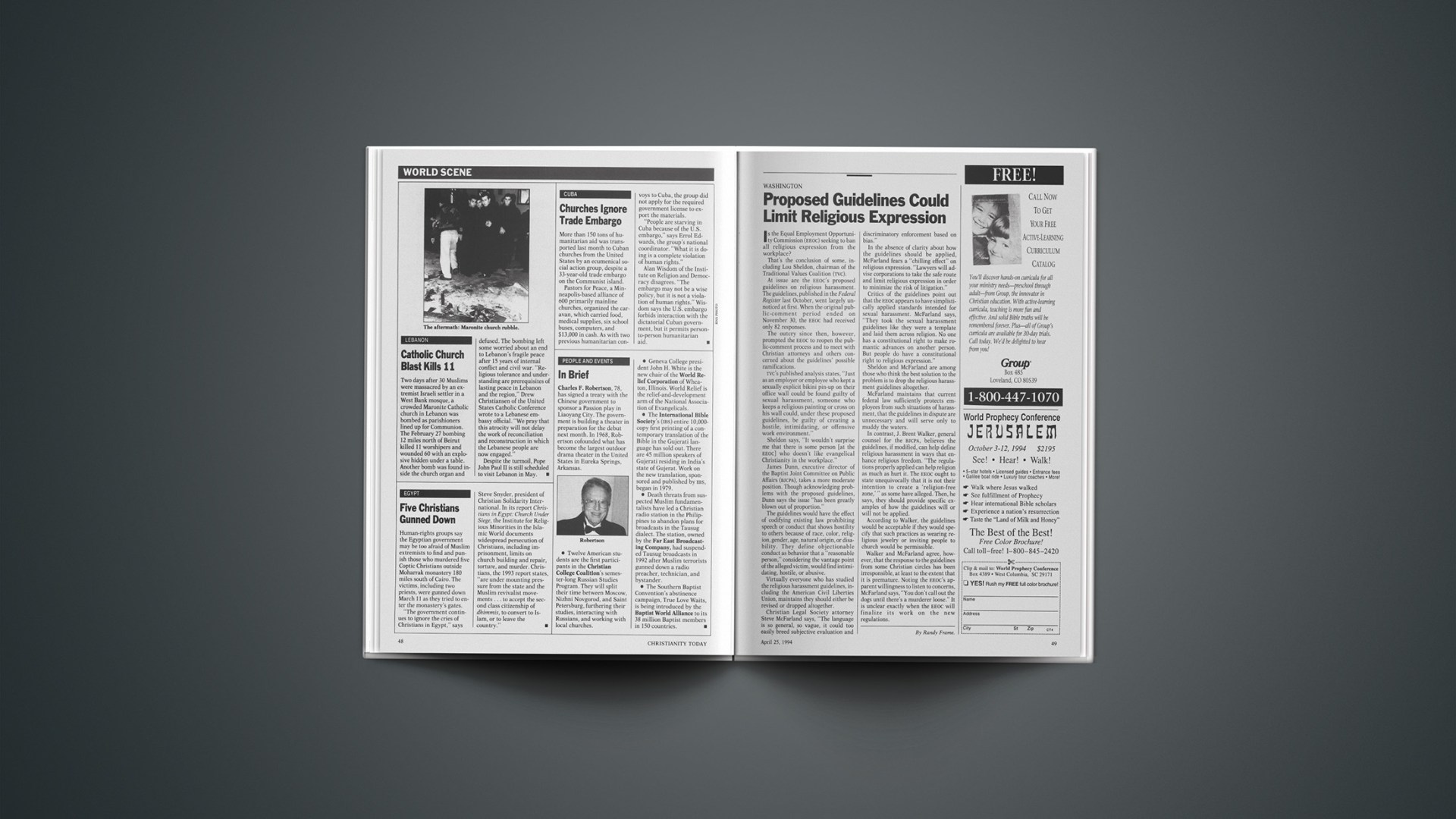Is the Equal Employment Opportunity Commission (EEOC) seeking to ban all religious expression from the workplace?
That’s the conclusion of some, including Lou Sheldon, chairman of the Traditional Values Coalition (TVC).
At issue are the EEOC’s proposed guidelines on religious harassment. The guidelines, published in the Federal Register last October, went largely unnoticed at first. When the original public-comment period ended on November 30, the EEOC had received only 82 responses.
The outcry since then, however, prompted the EEOC to reopen the public-comment process and to meet with Christian attorneys and others concerned about the guidelines’ possible ramifications.
TVC’s published analysis states, “Just as an employer or employee who kept a sexually explicit bikini pin-up on their office wall could be found guilty of sexual harassment, someone who keeps a religious painting or cross on his wall could, under these proposed guidelines, be guilty of creating a hostile, intimidating, or offensive work environment.”
Sheldon says, “It wouldn’t surprise me that there is some person [at the EEOC] who doesn’t like evangelical Christianity in the workplace.”
James Dunn, executive director of the Baptist Joint Committee on Public Affairs (BJCPA), takes a more moderate position. Though acknowledging problems with the proposed guidelines, Dunn says the issue “has been greatly blown out of proportion.”
The guidelines would have the effect of codifying existing law prohibiting speech or conduct that shows hostility to others because of race, color, religion, gender, age, natural origin, or disability. They define objectionable conduct as behavior that a “reasonable person,” considering the vantage point of the alleged victim, would find intimidating, hostile, or abusive.
Virtually everyone who has studied the religious harassment guidelines, including the American Civil Liberties Union, maintains they should either be revised or dropped altogether.
Christian Legal Society attorney Steve McFarland says, “The language is so general, so vague, it could too easily breed subjective evaluation and discriminatory enforcement based on bias.”
In the absence of clarity about how the guidelines should be applied, McFarland fears a “chilling effect” on religious expression. “Lawyers will advise corporations to take the safe route and limit religious expression in order to minimize the risk of litigation.”
Critics of the guidelines point out that the EEOC appears to have simplistically applied standards intended for sexual harassment. McFarland says, “They took the sexual harassment guidelines like they were a template and laid them across religion. No one has a constitutional right to make romantic advances on another person. But people do have a constitutional right to religious expression.”
Sheldon and McFarland are among those who think the best solution to the problem is to drop the religious harassment guidelines altogether.
McFarland maintains that current federal law sufficiently protects employees from such situations of harassment, that the guidelines in dispute are unnecessary and will serve only to muddy the waters.
In contrast, J. Brent Walker, general counsel for the BJCPA, believes the guidelines, if modified, can help define religious harassment in ways that enhance religious freedom. “The regulations properly applied can help religion as much as hurt it. The EEOC ought to state unequivocally that it is not their intention to create a ‘religion-free zone,’ ” as some have alleged. Then, he says, they should provide specific examples of how the guidelines will or will not be applied.
According to Walker, the guidelines would be acceptable if they would specify that such practices as wearing religious jewelry or inviting people to church would be permissible.
Walker and McFarland agree, however, that the response to the guidelines from some Christian circles has been irresponsible, at least to the extent that it is premature. Noting the EEOC’s apparent willingness to listen to concerns, McFarland says, “You don’t call out the dogs until there’s a murderer loose.” It is unclear exactly when the EEOC will finalize its work on the new regulations.
By Randy Frame.










